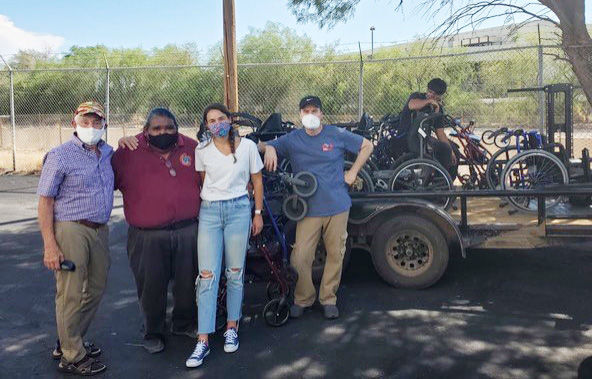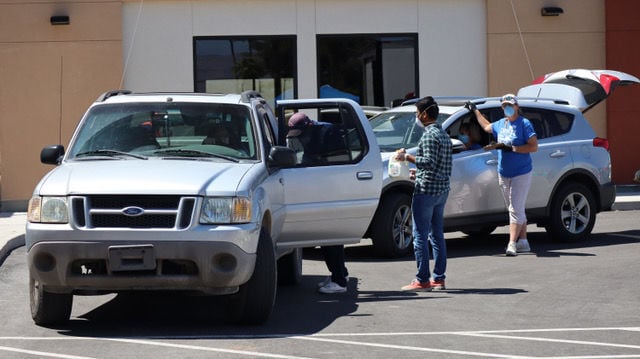Pandemic or not, local nonprofits that serve those in need are determined that Thanksgiving feasts will go forward.
But like almost everything else in 2020, the dinners may look a little different this year.
The Gospel Rescue Mission, which typically serves about 1,800 meals to hungry and homeless Tucsonans at its Community Thanksgiving Dinner, has modified the traditional celebration into a drive-through Thanksgiving dinner distribution with Thanksgiving Blessings to Go from 11 a.m. to 2 p.m. Wednesday, Nov. 25, at the H.S. Lopez Family Foundation Center of Opportunity, 4550 S. Palo Verde Road.
“For 31 years we have served a traditional Thanksgiving meal with all the trimmings at a sit-down banquet. We know there are more people in need this year than before, but to keep everyone safe, instead of sitting down, we will be standing in the food gap to serve people drive-through style with Thanksgiving Blessings to Go,” said Victor Hightower, development manager of the Gospel Rescue Mission.
The event is modeled after Blessings to Go, the food box distribution that the organization held at the onset of the pandemic.
For five weeks in March and April, the program distributed boxes holding the equivalent of 26,082 meals to 1,032 families. Hightower said it expects to serve 2,000 Thanksgiving meals and to provide each family with a resource box of nonperishable food and hygiene items.
“Lots of people have lost their jobs and many are having difficulty putting food on the table. We don’t want people to have to choose between paying bills and buying food. No one should have to get any meal, especially Thanksgiving, from a dumpster,” Hightower said.
Promotora Program
Another Thanksgiving dinner that will be distributed in boxes is the Free Community Thanksgiving Meal & Promotora Program that has been hosted at Armory Park Center for the past five years.
Formerly coordinated by Portable Practical Educational Preparation, or PPEP, and the Promotoras de Esperanza, the event will be facilitated by PPEP and the 3000 Club Tucson this year.
“The Promotoras have been hit very hard by COVID and many find themselves in need this year. The Promotoras and PPEP are like family ... we are united as family helping people. With social distancing guidelines, we have decided that rather than having one day where we feed as many as 3,000 people, we are feeding at least 3,000 people every week by giving out 35-pound food boxes with enough food for four people for one week,” said Dr. John David Arnold, CEO of PPEP.
Arnold said the distributions, known as “Thanksgiving Thursdays,” are held at various locations in Marana, South Tucson and rural communities including Arivaca, Amado, Patagonia and Rillito. The distributions will continue on Thanksgiving Day.
“Hunger is a huge problem and we only see it growing. It doesn’t end on Thanksgiving. With the pandemic, these food boxes will be needed well into next year, so we are now doing Thanksgiving year-round on Thursdays as long as the supply lasts,” said Arnold.
PPEP also offers assistance with rent, utilities and other basic needs as well as a Microbusiness Housing Development Corp., which merged last year with the nonprofit Southwest Medical Aid to become PMHDC Southwest Medical Aid.
Arnold said that PMHDC Southwest, which provides free, durable medical equipment for low-income Tucsonans, is a fast-growing arm of the nonprofit that has experienced an uptick in need during the pandemic.
The organization repurposes and distributes a wide variety of medical supplies through 46 nonprofit partners and social agencies. Its inventory includes hospital beds; wheelchairs, walkers and crutches; bandages, gauze and wound care supplies; hospital beds; shower chairs, blood pressure machines; bedside commodes; respiratory and diabetic supplies; incontinence supplies and more.
“Lots of people have wheelchairs or walkers or other items sitting around in their garages and we need donations of medical equipment for people who are shut-in. We have people laying on the floor in their homes in rural communities. Having a wheelchair is life-changing for them. It brings you to tears when you see the people we help,” Arnold said.
One of the organization’s greatest needs are financial donations that can be used for the purchase of batteries, tools and other equipment to make repairs.
“A quintessential example is that we might have a $10,000 motorized wheelchair that someone has dropped off and it works fine, but it needs a battery that costs $100 to $150. That is not a cost that we can cover, so if we can’t purchase the battery, the chair goes to waste. If we have the finances to cover small equipment like that, it can help us to be much more effective,” said Marina Burke, 22, an AmeriCorps volunteer who has worked with the group since July.
In the past 15 years, the group has repurposed more than 500,000 pounds of medical supplies and equipment back into Southern Arizona and statewide. It also distributes to neighboring Mexico and nationally when needed.
“In October alone, we donated over 15,000 pounds of materials that would have ended up in landfills if it hadn’t come into our warehouse and been re-allocated in the community,” Burke said.
Ultimately, Burke said the medical aid group has become even more relevant during the pandemic and she encourages Tucsonans to consider in-kind or cash donations.
“Medical equipment is in high demand. Even if the supplies needed are not related to COVID, Tucson has a high percentage of the population who might be undocumented or can’t afford health coverage or are between jobs because of the pandemic. All of those people fall into our system and we try to cover them the best we can,” Burke said.





